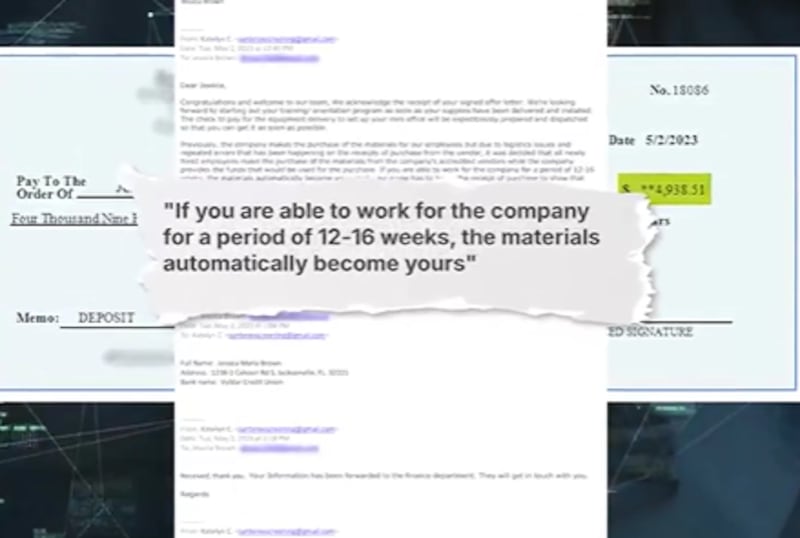ATLANTA — Channel 2 Action News found that work-from-home job scams have grown by more than 500 percent thanks in part to Artificial Intelligence targeting those who are most vulnerable.
[DOWNLOAD: Free WSB-TV News app for alerts as news breaks]
Channel 2 Consumer Investigator Justin Gray worked to learn how it happens.
Now, criminals are taking advantage of AI tools to scrape for personal information and make fake job opportunities even harder to spot.
TRENDING STORIES:
- A full litter box is not a reason to call 911, APD says
- 2 dead, 3 injured after single car crashes at Alpharetta intersection
- 2024 NFL schedule release: Here are the first 3 games for the Atlanta Falcons
Channel 2 Consumer Investigator Justin Gray looked into how scammers use sites like Indeed, LinkedIn and Facebook to target people.
Jessica Brown got an email from what she thought was Synterex, a well-known medical consulting company.
The email said,
“We reviewed your resume for the Junior Recruiter at Synterex. We think you could be a good fit for the opportunity.”
[SIGN UP: WSB-TV Daily Headlines Newsletter]
Brown filled out a few screening questions and got an offer of $30 per hour and health benefits to work from home.
Brown needed the money. She has a child and her husband recently suffered a severe stroke.
“I was vulnerable at that time,” Brown said. “It was hard for me.”
All she had to do, according to the “recruitment” letter was cash a nearly $5,000 check to pay for a mini office, including a laptop.
The letter said that if Brown was able to work for the company for a period of 12 to 16 weeks, the materials would automatically become hers.
Luckily, a bank spotted the situation as a scam right away. But that’s becoming harder to do because of artificial intelligence.
Eva Velasquez is the president and CEO of the Identity Theft Resource Center, which saw a 545% increase in reports in one month from December to January. Velasquez said that the quality of the fake checks and letters have gotten better because of AI.
“It’s a lucrative scam. It doesn’t take any time and it costs very little for the scammers to develop picture and letter-perfect templates and online profiles so it looks very, very legitimate,” Velasquez said.
Those AI-generated job scams can be much more dangerous than typical phishing emails. Crooks use AI to scrape your personal information online, then create and send a targeted attack.
The real Synterex said they have been digitally impersonated. The FTC said you should verify the job by visiting the official company website and applying there instead.
Syterex issued a statement to Channel 2 Action News, writing:
“Unfortunately, like many other companies, Synterex was targeted by a scammer who digitally impersonated us in early 2023. When we first became aware of the scam, we immediately published a post on LinkedIn to warn current and future clients as well as partners and team members that bad actors were using our brand name to ‘recruit’ new hires using unofficial email addresses. Since then, we have taken extra measures such as creating an official Glassdoor account and reporting any accounts that were impersonating us. We filed a formal complaint with IC3 back in 2023, though we have yet to hear back from any relevant authority or jurisdiction regarding this matter. Our team also took the extra step and responded to each person we could verify had been scammed via email to let them know that the requests came from a non-Synterex domain so they would cease communications with the scammers.
©2024 Cox Media Group








